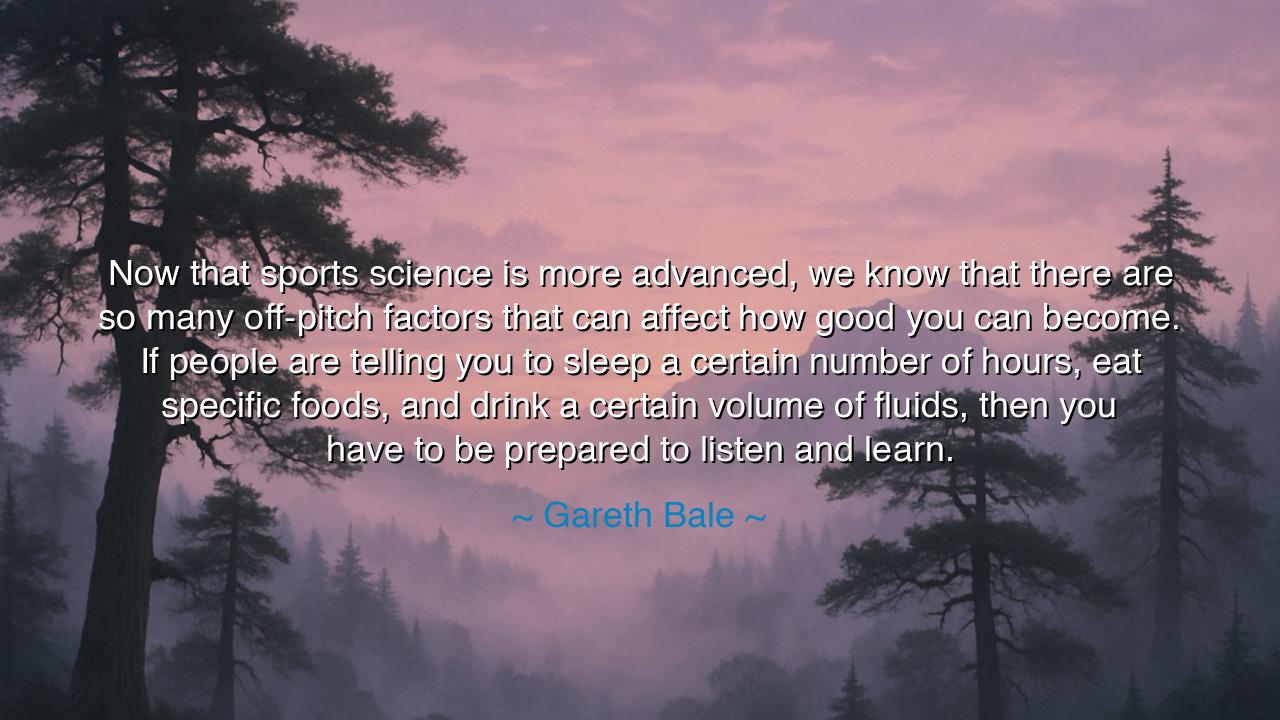
Now that sports science is more advanced, we know that there are
Now that sports science is more advanced, we know that there are so many off-pitch factors that can affect how good you can become. If people are telling you to sleep a certain number of hours, eat specific foods, and drink a certain volume of fluids, then you have to be prepared to listen and learn.






Listen, O children of wisdom, for the words of Gareth Bale speak not only of the pursuit of excellence in sport, but of a deeper truth that touches the essence of human potential. He said: “Now that sports science is more advanced, we know that there are so many off-pitch factors that can affect how good you can become. If people are telling you to sleep a certain number of hours, eat specific foods, and drink a certain volume of fluids, then you have to be prepared to listen and learn.” These words carry within them a profound understanding: that greatness is not only forged through talent and hard work but also through the careful cultivation of the mind and the body as a harmonious whole.
What, then, is the deeper meaning of these words, O seekers of truth? Bale speaks to us of the modern understanding of sports science, a field that has elevated the pursuit of athletic excellence beyond simple physical exertion. In the days of old, athletes relied upon raw strength, skill, and determination, but in the modern age, we now understand that there are many invisible forces—factors that may seem trivial or secondary—that play a key role in an athlete’s performance. The quality of sleep, the nutrition of the body, and the hydration of the cells are no longer afterthoughts; they are foundational elements of success. True mastery, whether in sport or in life, requires that we listen and learn not only from our instincts but also from the science that illuminates the hidden pathways to greatness.
Consider the story of Michael Phelps, the greatest swimmer to ever grace the waters of the Olympic Games. Phelps, a man who already possessed unmatched natural talent, also followed a regimen of diet, sleep, and training designed by his team of experts. His success was not born of raw talent alone, but of a deep commitment to science—understanding the precise nutrition his body needed, the rest it required to recover, and the fluidity of his muscles in motion. The science of sports—sleep patterns, food intake, and hydration—became the bedrock upon which Phelps built his victories. His mind and body worked in concert, the harmony of scientific understanding and athletic effort creating a synergy that led to historic success.
The wisdom here, O children, is that we must not be complacent in our pursuit of excellence, assuming that talent alone will carry us to greatness. The world has changed, and the path to success is no longer a straightforward path of brute strength or instinct. The ancient Greeks, who revered physical prowess, also understood the importance of balance and proportion in their athletic endeavors. They knew that the body and mind must work together in harmony, and the wise athletes trained not only their bodies but their minds and spirits as well. Bale’s words echo this ancient wisdom: greatness is not only the result of what we do in the moment, but of how we prepare ourselves in the hours and days leading up to that moment.
Think, O children, of the teachings of Leonidas of Sparta, the king who led his warriors at the famous Battle of Thermopylae. Though the warriors of Sparta were renowned for their physical prowess, they also honed their minds, their discipline, and their understanding of the forces that shaped their bodies. Their training was not only about strength; it was about endurance, strategy, and the wisdom to know what the body needed to reach its peak. Leonidas and his men understood the importance of mental fortitude, but also the science behind the fueling of the body and the importance of rest in preserving the strength for battle. It is through balance—just as much as through strength—that the true warrior is made.
The lesson here, O children of the future, is this: Greatness is not born solely from innate talent or desire. It is shaped through discipline, knowledge, and an understanding of the science that supports us in our endeavors. Whether you are an athlete, a scholar, or an artist, you must seek to listen to the wisdom that surrounds you. Understand the forces that govern your body, your mind, and your spirit. Do not dismiss the advice of those who know, for their counsel may be the key to unlocking the potential within you. Success is achieved not just through action but through understanding—the wisdom of knowing what your body needs to perform, and the patience to give it what it requires.
Therefore, O children of wisdom, as you walk the path to greatness, remember that the science of success is as much about what happens off the field—off the page, off the canvas—as it is about what happens in the moment of action. Prepare yourself through knowledge, rest, and balance, and recognize that every aspect of your life contributes to the performance you seek. Listen to the wisdom that surrounds you, and let science guide you to mastery in all things. The true pursuit of greatness lies not in a single burst of effort, but in the careful cultivation of your entire being, inside and out.






AAdministratorAdministrator
Welcome, honored guests. Please leave a comment, we will respond soon